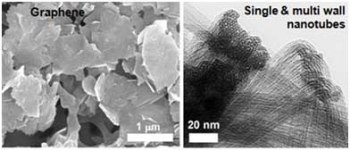Nov 19 2013
The “Ultrawire” project aims at producing a material that conducts electricity better than any known electrical conductor
 Carbon nanostructures produced at the University of Cambridge
Carbon nanostructures produced at the University of Cambridge
A consortium of 14 companies and universities has signed a €3.3 million funding contract through the European Commission’s FP7 program. The project, termed “Ultrawire”, aims to bring ultraconductive copper, a material that conducts electricity better than any known electrical conductor, within 3 years, to a level where pilot manufacturing can be planned. Consortium members are adding an additional €1.7million of their own funding to the project.
“This is an opportunity for Europe to capture early market share and new manufacturing jobs from the promising new technology of ultraconductive copper” says Jan Janssen, Technical Manager of the project and Senior Production Manager of Aurubis, the largest copper producer in Europe.
“We are exploiting forefront European carbon manufacturing technology and transferring exciting new materials into industry,” says Dr. Krzysztof Koziol, Head of the Electric Carbon Nanomaterials Research Group in the Department of Materials Science and Metallurgy at the University of Cambridge. “The EC’s FP7 funding recognises the power of transferring technology from Europe’s leading research institutions into companies responsible for producing and using millions of tonnes of copper each year.” Dr. Koziol is the project coordinator and the leading contact with the EC for the Ultrawire project.
“The copper industry’s participation in this project reflects the importance the industry places on improving the sustainability of its products through increased resource efficiency”, says John Schonenberger, Chief Executive of the European Copper Institute. “The EU has extremely ambitious CO2 emission reduction targets for 2050 and the necessary transition towards electricity, as the primary source of energy, will require significant quantities of highly-efficient conductor materials. While this technology is in the very early stages of development, with many significant hurdles to cross, ultraconductive copper would bring about a step change in the end-use performance obtainable from one tonne of copper.”
What is ultraconductive copper?
Ultraconductive copper is a composite of less than 1% of nano-carbon suspended in more than 99% of copper. It has an electrical conductivity, at room temperature, up to double that of pure copper. Its development started, in the last few years, primarily at US universities. Today it is only available on a laboratory scale. However, if its production process can be scaled-up, it will have the same world-changing potential that occurred in the 1800’s, when carbon was first added to iron to create steel. Eventually, motors, transformers, wind-generators and distribution wiring could be half the weight and size that they are today.
Ultrawire consortium members:
Cambridge University, University of Aalto at Helsinki, AGH Krakow University of Science and Technology, Aurubis Belgium, National Grid Electricity Transmission, Peugeot Citroen Automobiles, PE International, KME Germany, Outotec Oy, Institute of Occupational Medicine, Invro, Cambridge Nanomaterials Technology, Wieland-Werke, Nexans France.
More details on the Ultrawire project are available at: http://cordis.europa.eu/projects/rcn/108893_en.html
For further information about the Ultrawire project, contact Dr. Bojan Boskovic, Exploitation and Dissemination Manager, Ultrawire Project: [email protected]